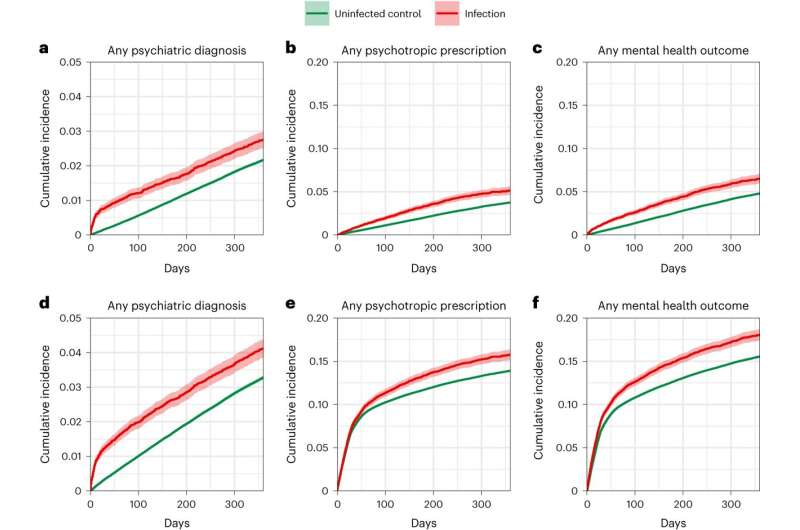
A new study published in Nature Human Behaviour sheds light on the long-term mental health consequences of COVID-19 infection and the growing evidence of the protective effect of vaccination on reducing the risk.
The research, conducted in a population-based cohort from UK Biobank, highlights the increased risk of psychiatric disorders and related prescriptions among COVID-19 survivors, emphasizing the extra mental health burden imposed by the pandemic.
Junqing Xie, Postdoctoral Researcher in Pharmacoepidemiology and Pharmacogenetics at NDORMS, University of Oxford led an international team of researchers to expand on earlier studies that reported an increased risk of neurological and psychiatric disorders in individuals admitted to hospital or infected with COVID-19.
Junqing said, “These findings, however, were biased towards patients who had sought testing for COVID-19 in the first two years of the pandemic and didn’t allow for those with an asymptomatic infection or new variants such as omicron.”
To examine long-term mental health outcomes and the protective effect of vaccination, the cohort was divided into three groups: individuals with SARS-CoV-2 infection (26,101 participants), contemporary controls without infection (380,337 participants), and historical controls predating the pandemic (390,621 participants). The findings revealed that infected participants had a higher subsequent risk of developing various mental health disorders, including psychotic, mood, anxiety, alcohol use, and sleep disorders and was higher still for individuals who were hospitalized due to COVID-19.
However, the risks were reduced in fully vaccinated individuals, possibly highlighting the protective effect of vaccination against the development of new psychiatric disorders and the progression of existing ones.
The research also indicated that breakthrough infections, occurring in individuals despite having received the primary 2-dose vaccination, did not increase the risk of mental health diagnoses compared to the vaccinated (uninfected) participants, but there was still a sign of increased risk for more psychotropic medications.
Junqing said, “Given the existing large number of COVID-19 survivors (so far, ~700 million globally), the increasing number of reinfections worldwide accompanying the loosening of COVID-19 restrictions, and the waning public’s appetite for boosters, the infection-triggered psychiatric disorders may translate into an enormous global burden of mental health on top of others.
“Our study therefore underscores the need for policymakers and health systems to develop priorities and long-term strategies for the early identification and treatment of affected individuals, especially in vulnerable survivors of COVID-19, to mitigate psychiatric disorders and enhance well-being post-pandemic.”
